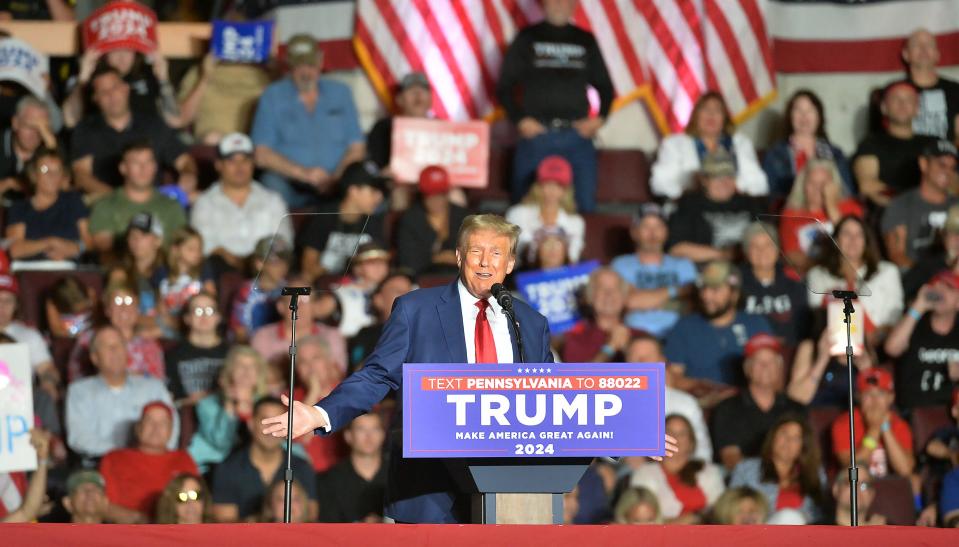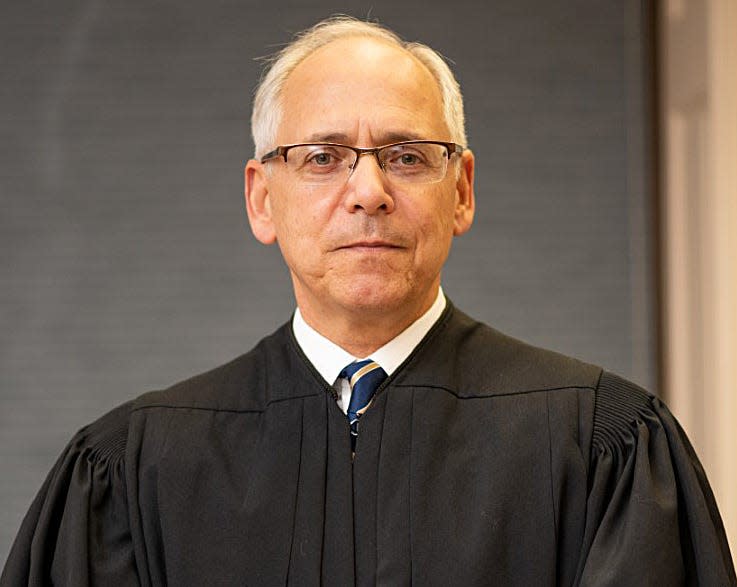Project Veritas settles libel suit, says 'no evidence' of ballot fraud at Erie post office
The right-wing activist group Project Veritas has settled a lawsuit with an Erie postmaster over the group's false claims that the postmaster was part of a plot to tamper with mail-in ballots to the detriment of Donald Trump in his unsuccessful campaign to get reelected as president in 2020.
The claims and the lawsuit, which the postmaster filed in Erie County Common Pleas Court in 2021, placed Erie in the frenzy over Trump's unfounded allegations that the mishandling of mail-in ballots helped President Joe Biden steal the White House from him.
Project Veritas and its founder, James O'Keefe, issued statements Monday in which they apologized to Robert Weisenbach, the postmaster in Erie, and said Project Veritas' reports on election fraud at the Erie post office were based on wrong information — as Weisenbach contended from the start. The reports wrongly accused Weisenbach of backdating mail-in ballots.

Project Veritas and O'Keefe — who was removed as the head of Project Veritas in 2023 — based their reporting on allegations from a now-former postal worker, Richard Hopkins, who characterized Weisenbach as part of an anti-Trump plot to tamper with the mail-in ballots.
Trump referred to Hopkins as a "brave patriot" as Project Veritas published its reports following the election in November 2020.
Hopkins also issued a statement of apology on Monday. The statements were issued on X, formerly known as Twitter.
'This case was resolved,' says Weisenbach's lawyers
Protect Democracy, an advocacy group whose lawyers assisted Weisenbach in the lawsuit, posted the statements on its website Monday and said "this case was resolved in a manner acceptable to all parties." Weisenbach sued Project Veritas, O'Keefe and Hopkins.
One of the lawyers who represented Weisenbach, David Houck, of Pittsburgh, could not be immediately reached for comment, but Houck told NBC News that "The only comment I’m allowed to make about it is that the case was filed, was litigated and settled to the satisfaction of the parties."
A media representative for Protect Democracy told the Erie Times-News in an email on Tuesday that the organization's only comment is "to affirm that the matter was resolved in a manner that is acceptable to all parties."
A lawyer who represented Project Veritas and O'Keefe, Benjamin Barr, of Chicago, could not be immediately reached for comment. A lawyer who represented Hopkins, David Heim, of Philadelphia, also could not be reached.
Settlement documents had not been filed in the case at the Erie County Courthouse as of Tuesday. An oral argument over evidence had been scheduled for Jan. 12 before Judge Marshall Piccinini, who was assigned the case. Piccinini on Jan. 12 canceled the hearing at the request of the parties, and nothing has been docketed in the case since then.
Apologies from Project Veritas, O'Keefe and Hopkins
The statement from Project Veritas reads:
"In November 2020, Project Veritas reported that election fraud had occurred in Erie, Pennsylvania during the 2020 Presidential Election. This story was based on Richard Hopkins’s claim that he had overheard Robert Weisenbach, the Erie Postmaster, direct another USPS supervisor to illegally backdate mail-in ballots.
"Mr. Hopkins has since come to learn that he was wrong — neither Mr. Weisenbach nor any other USPS employee in Erie, Pennsylvania engaged in election fraud or any other wrongdoing related to mail-in ballots. With this update, Project Veritas is aware of no evidence or other allegation that election fraud occurred in the Erie Post Office during the 2020 Presidential Election."
The statement from O'Keefe is the same as Project Veritas', except that O'Keefe says that "I reported that election fraud had occurred" and that "I am aware of no evidence or other allegation that election fraud occurred in the Erie Post Office during the 2020 Presidential Election."
In his statement, Hopkins said he had only heard a "fragment" of the conversation at the Erie General Mail Facility, on East 38th Street, that led him to report his claims to Project Veritas.
"As a USPS mail carrier at the time, I was on heightened guard considering many allegations of ‘widespread fraud’ plaguing the 2020 Presidential Election," according to Hopkins' statement. "As I have now learned, I was wrong. Mr. Weisenbach was not involved in any inappropriate behavior concerning the 2020 Presidential Election. The OIG (the Postal Service's Office of Inspector General) investigated and found that neither Mr. Weisenbach nor any other USPS employee in Erie, Pennsylvania engaged in election fraud or any other wrongdoing related to mail-in ballots.
"I apologize to Mr. Weisenbach, his family, the employees of the Erie Post Office, and anyone that has been negatively impacted by my report. I implore everyone reading this statement to leave the Weisenbach family alone and allow them to return to their normal, peaceful, lives."
A 'whistleblower' brings claims to Project Veritas
Hopkins first appeared on Project Veritas' online reports as an anonymous source on Nov. 5, 2020 — and the reports soon led to backlash for Weisenbach and his family, even though Weisenbach supported Trump.
Hopkins alleged to O'Keefe that on Nov. 4, 2020, he had heard Weisenbach and another supervisor discussing the backdating of mail-in ballots that arrived after Election Day, Nov, 3, 2020. With Democrats favoring the use of mail-in ballots over Republicans, the allegation was that the backdating had aided Biden over Trump.
Project Veritas, with offices in Westchester County, New York, circulated the claims on its social media platforms, dubbing Hopkins a "whistleblower." Hopkins' claims went viral as Trump and his supporters insisted the election was rigged against him.

Hopkins, still anonymous, also told O'Keefe on Nov. 5, 2020, that Weisenbach wanted the ballots backdated because Weisenbach is "a Trump hater" — an allegation that Weisenbach said is false. He said he voted for Trump, according to the lawsuit.
On Nov. 6, 2020, the day after the first Project Veritas story ran, an unknown man confronted Weisenbach at his residence, according to the lawsuit. The man left after Millcreek Township police got involved, but Weisenbach and his wife were forced to temporarily abandon their home and take up refuge at a hotel two hours from Erie following the confrontation, according to the lawsuit.
After his Nov. 6, 2020, interview with the Postal Service investigators, Hopkins revealed his identity in a new Project Veritas report and defended his claims. After another interview with the Postal Service investigators, on Nov. 9, 2020, he told Project Veritas in a Nov. 11, 2020, report that the investigators intimidated him and that he stood by his original account.
A day earlier, Nov. 10, 2020, Hopkins posted a video on YouTube declaring that, despite the news reports otherwise, "I did not recant my statements." Trump that day retweeted Hopkins' video and, on a Twitter post, called Hopkins a "brave patriot."
The Postal Service placed Hopkins on unpaid leave on Nov. 10, 2020, saying that "your actions may have placed employees and yourself as well as the reputation of the Postal Service in harm's way," according to a letter to Hopkins that was included in Weisenbach's lawsuit.
Hopkins resigned his job in April 2021, one of his lawyers said at a hearing before Piccinini.
Project Veritas and the other defendants wanted the lawsuit tossed, claiming that the First Amendment protected Project Veritas' reports on Weisenbach. The defendants contended, among other things, that the reports constituted opinion rather than fact.
Weisenbach's lawsuit focused on 'actual malice'
Weisenbach contended that the Project Veritas and the other defendants were liable for libel and defamation because they acted with "actual malice" — that they published the allegations about Weisenbach knowing the allegations were false or that they failed to adequately investigate the allegations' veracity.
Piccinini refused to dismiss the case in July 2022. He ruled against the preliminary objections of Project Veritas, O'Keefe and Hopkins. His ruling allowed Weisenbach's suit to advance to the next stage, the evidence-gathering process known as a discovery, which includes depositions.

Among the claims that Piccinini said Weisenbach had grounds to dispute was Hopkins' claim that he was a "Trump hater." Piccinini in his ruling in July 2022 referred to September 2020 photos included in the lawsuit that showed Weisenbach holding a "Trump: Make America Great Again" flag and another of him wearing a "Trump 2020" face mask. That information, Piccinini said in his ruling, evinces "the provable falsity of Weisenbach's supposed animosity toward President Trump," Piccinini said in his ruling.
Weisenbach's lawyers claimed that Hopkins' allegations appealed to Project Veritas because they fit the organization's "preconceived narrative" — its belief that the election was manipulated against Trump through the mishandling of mail-in ballots.
Weisenbach's lawyers were pressing for Project Veritas to turn over more information related to its coverage of supposed election fraud when the lawyers asked Piccinini to hold a hearing on that issue on Jan. 12 — the hearing that never occurred. Weisenbach's lawyers said in court records that Project Veritas dubbed the election project "Diamond Dog" or "Diamond."
Project Veritas and O'Keefe remained adamant that they had not engaged in a "preconceived narrative" and that they had done nothing wrong in the reports on Weisenbach. Project Veritas practiced "investigative journalism" meant to uncover fraud, their lawyers said.
More: Threats rise after Phoenix migrant shelter targeted online by right-wing activist
"Project Veritas's and James O'Keefe's journalism protects democracy," their lawyers said in a filing in 2023 in which they opposed turning over more information.
Weisenbach's lawyers contended, in their own filing in 2023, that the requested information was relevant. They argued that Project Veritas and O'Keefe defamed Weisenbach as part of "ulterior motives" — to get Trump reelected.
"The 'Diamond' effort," Weisenbach's lawyers said in the filing, "aimed to promote narratives of voter fraud and sow doubt in the security of mail-in ballots in order to benefit President Trump's reelection campaign and PV's bottom line."
Contact Ed Palattella at [email protected]. Follow him on X @ETNpalattella.
This article originally appeared on Erie Times-News: Project Veritas settles libel case with Erie postmaster, apologizes
Solve the daily Crossword

